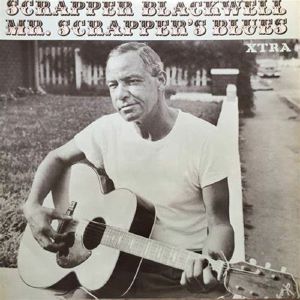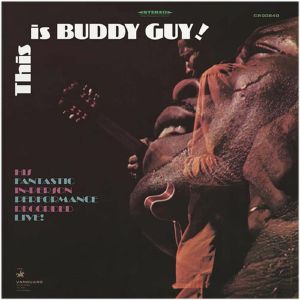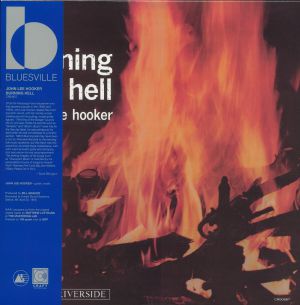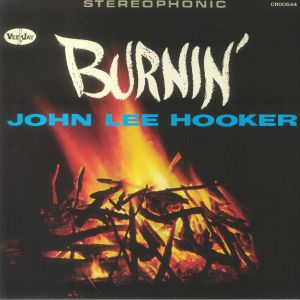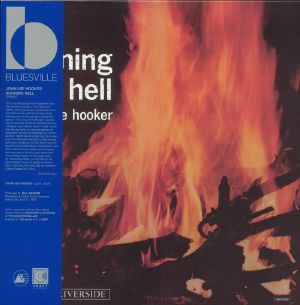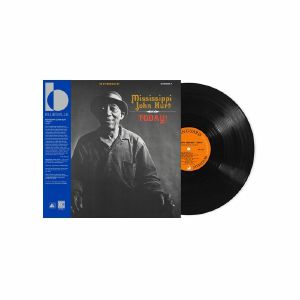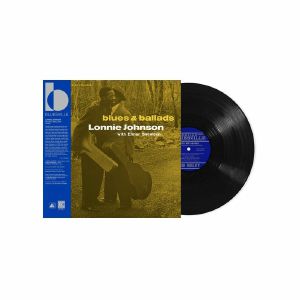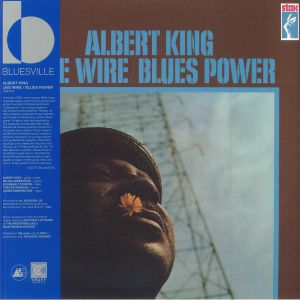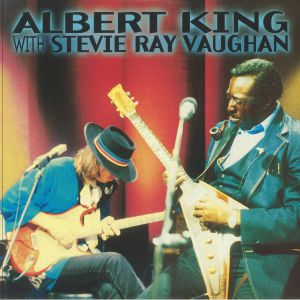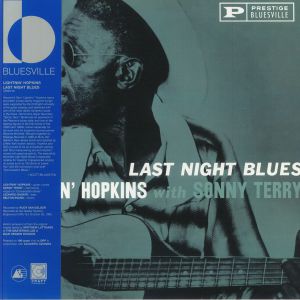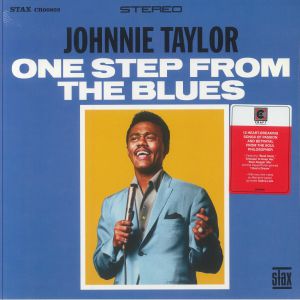Filter
Stock
Type
Music
Format
Artist
Label
Featured
Release Title
Price
Back catalogue: Blues
Juno's full catalogue of Blues
Albums
Mr Scrapper's Blues (Bluesville Acoustic Sound Series) (180 gram vinyl LP with obi-strip)
Cat: CRF 1699241. Rel: 21 May 25
Review: Scrapper Blackwell's final recordings, laid down in Indianapolis in 1961, marked the return of a blues guitarist and singer who had been silent since the mid-30s. Mr. Scrapper's Blues was released posthumously in 1962, just after Blackwell was shot and killed - a stark coda to a career shaped by both brilliance and misfortune. First out on Prestige's Bluesville sublabel, this stark, unclipped LP finds Blackwell alone at the mic, handling guitar, piano and vocals himself. The South Carolina-born, Indiana-raised musician earned early fame through his trailblazing partnership with Leroy Carr in the late 1920s and 30s, before vanishing from music entirely following Carr's death. This 180-gram reissue from Craft revives that late-career spark via an all-analogue mastering by Matthew Lutthan.
… Read more in stock $41.36
This Is Buddy Guy! (Bluesville Acoustic Sound Series) (180 gram vinyl LP)
Cat: CRF 1699201. Rel: 14 May 25
in stock $43.88
Burning Hell (reissue) (180 gram vinyl LP with obi-strip)
Cat: CR 00657. Rel: 05 Jun 24
Review: John Lee Hooker's Burning Hell is a searing and intense album that captures the raw power and emotion of the blues. Originally released in 1964, the album has been reissued on vinyl and remains n important milestone to Hooker's artistry. The album opens with the title track, a slow-burning blues that sets the tone for the rest of the album. Hooker's vocals are raw and passionate, and his guitar playing is both hypnotic and driving. The album also features several classic blues standards, including 'Baby Please Don't Go' and 'Key to the Highway.' The album is a timeless classic that continues to inspire and amaze listeners today.
… Read more! low stock $39.96
Burnin' (60th Anniversary Edition) (remastered) (limited 180 gram translucent red vinyl LP (indie exclusive))
Cat: CR 05192. Rel: 06 Mar 23
in stock $32.71
Burning Hell (reissue) (B-STOCK) (180 gram vinyl LP with obi-strip)
Cat: CR 00657 (B-STOCK). Rel: 01 Jan 90
B-STOCK: Record slightly warped
Review: ***B-STOCK: Record slightly warped***
John Lee Hooker's Burning Hell is a searing and intense album that captures the raw power and emotion of the blues. Originally released in 1964, the album has been reissued on vinyl and remains n important milestone to Hooker's artistry. The album opens with the title track, a slow-burning blues that sets the tone for the rest of the album. Hooker's vocals are raw and passionate, and his guitar playing is both hypnotic and driving. The album also features several classic blues standards, including 'Baby Please Don't Go' and 'Key to the Highway.' The album is a timeless classic that continues to inspire and amaze listeners today.
… Read moreJohn Lee Hooker's Burning Hell is a searing and intense album that captures the raw power and emotion of the blues. Originally released in 1964, the album has been reissued on vinyl and remains n important milestone to Hooker's artistry. The album opens with the title track, a slow-burning blues that sets the tone for the rest of the album. Hooker's vocals are raw and passionate, and his guitar playing is both hypnotic and driving. The album also features several classic blues standards, including 'Baby Please Don't Go' and 'Key to the Highway.' The album is a timeless classic that continues to inspire and amaze listeners today.
in stock $31.30
Today! (Bluesville Acoustic Sound Series) (180 gram vinyl LP with obi-strip)
Cat: CRF 1681711. Rel: 12 Mar 25
Review: Originally recorded in 1966 during his remarkable comeback - he'd been playing since the 20s but was rediscovered by various musicologists and found a new audience at Newport and Philadelphia's folk festivals in 1963 - this album demonstrates why he became a beloved mainstay of the folk revival. Unlike traditional bluesmen, Hurt's style is rooted in melody and intricate fingerpicking, making him a profound influence on the folk musicians of the 60s. His dexterous guitar work, often feeling as if multiple players are involved, pairs seamlessly with his soothing, almost meditative voice. Tracks like 'Pay Day', 'Louis Collins', 'Spike Driver's Blues', and 'Make Me a Pallet on Your Floor' showcase his ability to transform folk and blues traditions into something uniquely personal. He even delivers a rare but successful slide guitar performance on 'Talking Casey'. A particularly stunning moment comes in 'Beulah Land', where his intricate cross-rhythms add new emotional depth to a traditional song. Every track exudes a gentle, comforting presence, as if Hurt himself is sitting beside the listener, easing their troubles. His voice, often described as a balm for the soul, remains as rich and warm as ever, untouched by time. A beautiful, healing and profoundly moving experience that continues to impress more than half a century later.
… Read more in stock $44.16
Blues & Ballads (Bluesville Acoustic Sound Series) (180 gram vinyl LP with obi-strip)
Cat: CRF 1681701. Rel: 12 Mar 25
Review: American jazz singer, guitarist, violinist and songwriter Lonnie Johnson is widely recognised as a pioneer of jazz guitar and jazz violin, at the storied late 1950s cutoff point where blues crossed into "jass". Known as one of the first, if not the first, blues-jazz players to ever play the electric violin, this new retrospective record, documenting his best works with fellow guitarist Elmer Snowden, sadly nonetheless does not feature this remarkable feat, although it does scout an impressive terrain through Johnson's versatility on electric guitar and vocals. Though masterful, these performances still flaunt the make-do character of the Toronto native's musical upbringing. Take 'Blues For Chris', a rather avant-garde domestic tease of a track that only faintly pulses through the blues form, as Johnson janks and picks at the guitar whilst seeming to tell a premortem joke.
… Read more in stock $43.88
Live Wire/Blues Power (reissue) (180 gram vinyl LP with obi strip)
Cat: CR 00745. Rel: 12 Sep 24
Review: Recorded in 1968 at the Fillmore Auditorium in San Francisco, California; Live Wire/Blues Power is a timeless live album by the great blues guitarist Albert King. Known as one of the "three Kings of blues" alongside BB King and Freddie King, this courtly rally, mic'ed up to pristine clarity, hears the wisest of these three wise men proclaim the universally apprehensible power of the blues. Alongside standards from Herbie Hancock ('Watermelon Man') and B.B. ('Please Love Me'), 'Blues Power' is the most salient track here, sticking out among the bunch as a song exclusively performed for this unassailable live show and this unassailable live show alone. "Everybody understands the blues... everybody from one day to another has the blues... you take the lil' baby that's laying in the cradle, he can't get that milk bottle fast enough, he go to kickin' and cryin' and going on tearin' up the little baby bed... he got the blues! Can you dig it?!" Nobody escapes the blues, and that is its power. Now, *that* is a message we can get behind.
… Read more in stock $35.76
In Session (25th Anniversary Edition) (trifold 180 gram vinyl 3xLP)
Cat: 008880 72525597. Rel: 17 Oct 24
Review: Craft Recordings Deluxe Edition of In Session, featuring the legendary collaboration between blues titans Albert King and Stevie Ray Vaughan, is an important new edition of this meeting of legends. This long-awaited release arrives for the first time on triple vinyl, capturing the historic 1983 performance at CHCH-TV studios in Ontario, Canada, where the two guitarists showcased their extraordinary talents. Initially hesitant to share the stage with Vaughan, King quickly recognised the young guitarist's immense skill, leading to a profound musical dialogue that reverberates throughout this recording. The set includes the audio debut of iconic tracks such as 'Born Under a Bad Sign', 'Texas Flood' and 'I'm Gonna Move to the Outskirts of Town', offering fans an unparalleled listening experience. As they exchange licks, Vaughan breathes new life into King's classic riffs, demonstrating the evolution of their craft. The remastered performance, pressed on high-quality 180-gram vinyl and housed in a gatefold jacket, celebrates a momentous occasion in blues history. This collection not only highlights the dynamic interplay between two guitar legends but also sets a new standard for live blues recordings.
… Read more in stock $62.33
Last Night Blues (reissue) (180 gram vinyl LP with obi-strip)
Cat: CRF 1594281. Rel: 12 Sep 24
Review: Last Night Blues is Texas blues guitarist and songwriter Lightnin' Hopkins' 1961 album, featuring avant-harmonicist Sonny Terry. The second of three album collaborations, this record flaunts Hopkins and Terry's different yet complementary styles, creating a well-rounded listening experience in pristine stereo. From the title track to the ending 'Conversation Blues', we're served vibes of a quiet recording space, in which Hopkins is provided ample room to muse on his various disappointments and dissatisfactions, both in romance and life. Though this is done in a manner that is convincingly purgatory, putting across the feel of Hopkins "getting on with it", despite the quibbles of life, in a manner that only the best blues music does. Terry's harmonica is like a vague but striking apparition, gliding it at just the right moments yet with just the right dose of when-to-play sensitivity.
… Read more in stock $33.52
Review: The latest release from Craft Recordings shifts its focus to soul legend Johnnie Taylor, highlighting his deep connection to blues. Known for his Southern soul roots, Taylor's legacy extends far beyond his mainstream hit 'Disco Lady'. Born in Arkansas in 1934, Taylor began his career in gospel before making a name at Stax Records with hits like 'Who's Making Love', which cemented his place in soul history. This new release, One Step From The Blues, dives into Taylor's more blues-focused work, showcasing 12 powerful tracks that capture the raw emotion of heartbreak and betrayal. The album features Taylor's debut Stax single 'I Had a Dream', a sparse and intense standout, along with tracks like 'Cheaper to Keep Her' and a vibrant cover of Sam Cooke's 'That's Where It's At', Each song is delivered with Taylor's unmistakable voice, drawing from both his gospel and blues roots. With the support of top Memphis musicians and insightful new liner notes from journalist Andria Lisle, One Step From The Blues is a brilliant celebration of Taylor's lasting influence, as he marks his 90th birthday this year.
… Read morePlayed by: Juno Recommends Soul
in stock $32.41

 USD
USD





